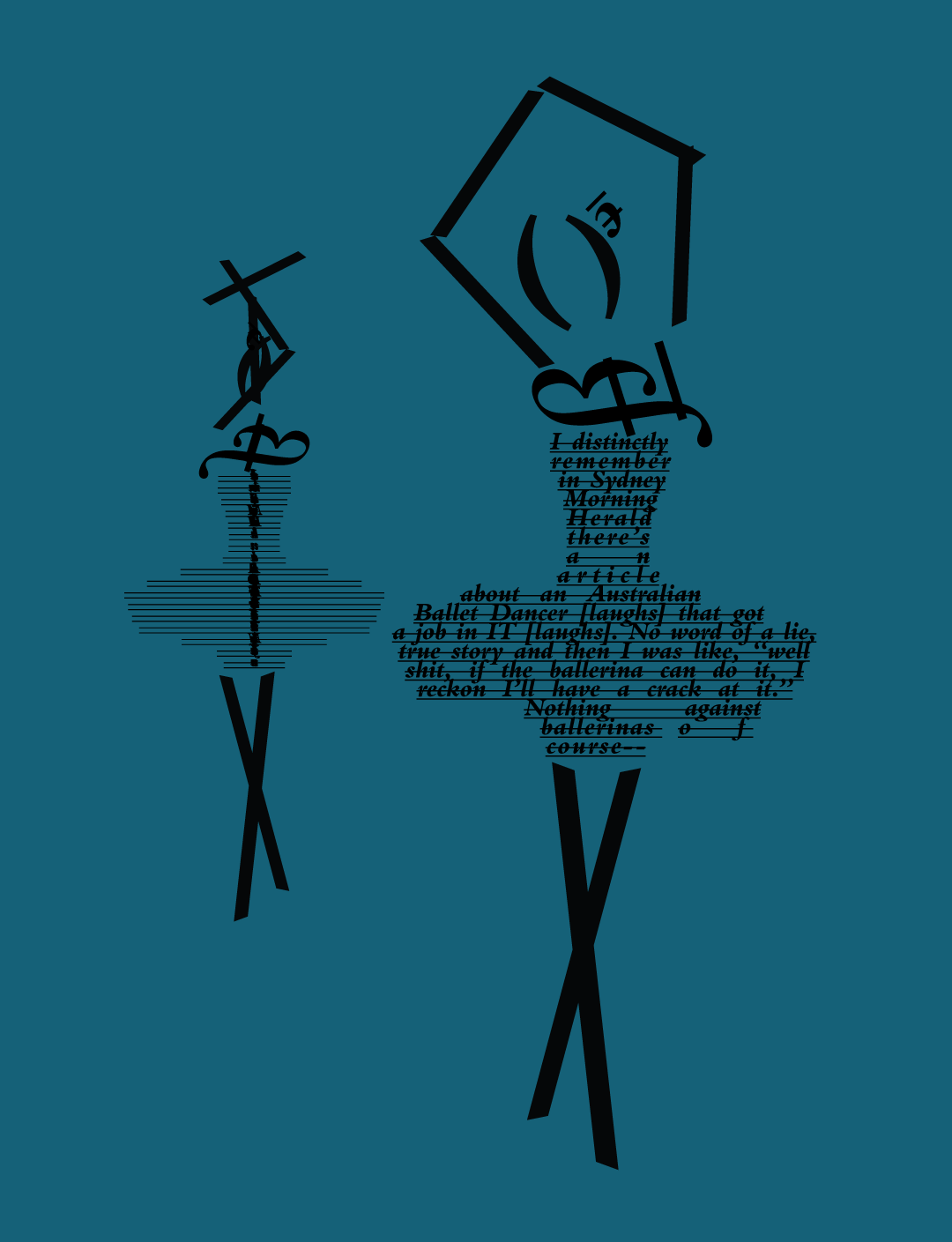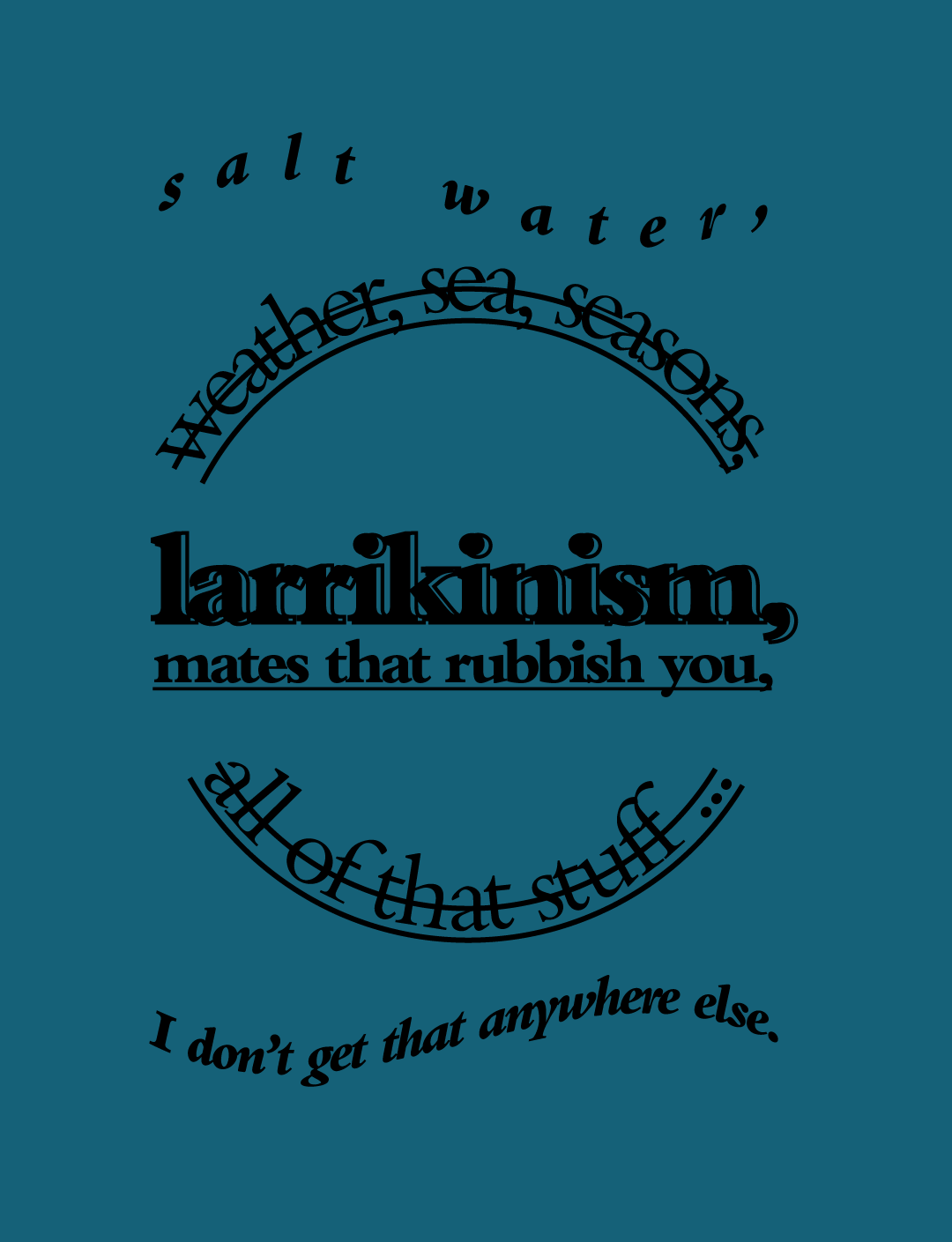Cameron Avery--- 17 December 2014
By Lorenzo Princi
What do you do?
[Laughs] Well I’m a dad, I’m a husband, I’m an acronym, so CEO will be the acronym, that’s who. The what, what do I do? Run a company, listen to people, build a product, talk a lot, I think that’s what I do the most, I talk a lot, to people and then I evaluate what they want and then-- and this is purely in the acronym term of who I am, work with a team of people to build that. Bit of a-- not an exciting answer mate...
How did you get into the I.T. space?
Accidental. By-- by, life I guess, with just-- It was just-- it’s where my path took me. So I went to-- I went to university, did a bachelor of building degree, architecture, project management, building skyscrapers. Went on a building site, realised there wasn’t many women there, so quit really quickly [laughs].
Started working in big restaurants, there were a lot of women there, [laughs] found my beautiful wife there as well. Did that for many years, made a great living, had a great life and then, I remember reading in Sydney Morning Herald-- my brother said “hey--” my brother Craig, who was working in IT said, “you should consider working in IT” and I distinctly remember in Sydney Morning Herald there’s an article about an Australian Ballet Dancer [laughs] that got a job in IT [laughs]. No word of a lie, true story and then I was like, “well shit, if the ballerina can do it, I reckon I’ll have a crack at it.” Nothing against ballerinas of course--
So then I literally walked in and coming from working in restaurants-- hospitality is tough, brutal, you work, you’re on your feet, you work every holiday. My brother got me this job interview at Express Data, which is IT distribution and anybody who wants a job in IT, go and work at a distributor. Why? Well maybe not in the future as the cloud becomes omnipresent but because I touched every technology that was out there: Cisco, Juniper, Microsoft, Symantec, any tech companies, I got a crash course in and then I-- I learnt this thing, you know? I thought a router was to cut wood, no, it’s to route packets, learnt what packets-- Layer 7-- awesome! And then that’s how I got into it and very quickly they found that, “wait a second--” number one, I thought it was the-- yeah-- I honestly thought it was the easiest job I’d ever done in my life, are you kidding me, like, I come from restaurants, working hard, sure I was the general manager, it’s not like I was running around serving tables but you work hard and then these guys paid me money to basically-- they paid me to learn all of these cool products. Then they gave me money to take clients out to the pub, to have drinks with them and create relationship which is not that hard, for me, I love talking to people, so easy and of course build a trust and get them buying from this distributor. Easiest job I think I’ve ever had. Put on ten kilograms, joke, drink, eat too many cakes, long lunches. So that’s how I got introduced to IT.
I did do a stint in the movie industry before that, so-- so I did restaurants and I worked on Mission Impossible 2 in the greens department, hiding stunt jumps with bushes [laughs] I got good money for doing that but I lasted about, I think-- I lasted about five months in the movie industry. I actually got a job-- I could go into IT distribution and then I also got a job on Moulin Rouge, which I just said, “look this is not the industry for me.” That’s when I went into IT. So that’s how I got there and I guess I went there, I learnt about products, I learnt about selling professionally.
"I distinctly remember in Sydney Morning Herald there’s an article about an Australian Ballet Dancer [laughs] that got a job in IT [laughs]. No word of a lie, true story and then I was like, “well shit, if the ballerina can do it, I reckon I’ll have a crack at it.” Nothing against ballerinas of course."

You were the Cisco Marketing Manager at Express Data, no doubt with your people skills you could have gone quite far in the corporate space, why risk starting your own company?
Very good question I think [laughs]. I don’t know whether you can publish the answer to this one [laughs]. Yes you can, you can, I don’t care. I-- yeah I did well, I did well in sales. I got promoted within-- like, honestly, it was the easiest job I’ve ever done and then I got promoted very quickly to a senior sales exec. Suddenly, car account, credit card, take people out, that was my job. Corporate box at the stadium, tickets to every(thing)-- like it was-- to me it was a very simple job. I am not-- I don’t think I’m the smartest guy in the room, I think-- I like people and have, I think a high social IQ. I think there are two different types of IQ and I think that-- and I didn’t know that I just-- okay, this is pretty easy and then I got promoted very quickly inside this corporate environment and you’re right, they promoted me really quickly, they were like, “okay, we’re going to keep pushing this guy up.”
Then I became a marketing manager and that put me on the journey to where I am today because, you know? I was just in awe of how much money got wasted, just thrown away on, ads, like magazine ads and corporate boxes and booze ups and I had-- you know? I became Cisco Marketing Manager and I had a million dollar budget and it was just blown! I shouldn’t use these words right? Back then, that’s what you did, that was marketing. Ads in ARN, you do this, you’re at the corporate box, you do this, you have a golf day, retreat, all that kind of stuff. That was really sophisticated marketing and that-- that’s when I was-- started-- I, at night taught myself something called Macromedia Flash 2 because somebody told me you could be a director, you can actually direct the story, you can do the sound, the editing and I was-- I got addicted to that, right? And I loved that.
And then I was thinking, well we spend all this money on static stuff but you can’t track and process what the hell happens here. All this money we are spending, we couldn’t account to, what was your return on that investment and by the way I think that concept was so foreign back then, we invented something called-- anyway, so I was going to go up-- I then met a very smart guy called Alojz Kiseli who’s a big partner of-- in our business and he-- if you’ve ever met two yin and yangs, we were yin and yang. This guy [laughs], coder, still had a great social IQ, could drink like a fish but, I would go to him and go, “I have this problem, look, I can make these images move across the screen, can’t we get people to it via this thing called email and then can we at least find out who looked at it?” or something like that, “No, can’t do it” basically that was-- but he’d go home though, in his own time, he would look at it and look-- he was a coder but then he’d look at things called variables and there was Actionscripting-- anyway, cut a long story short we figured out a way of actually starting to track interactions right and this was bleeding edge and I then was bringing this into this I.T. company and they were seeing a lot of value in this, the distributor, they were going to sell this product to all of their clients to make a ton of money and I had a lot more ideas, which I always used to bring up to Alojz, the guy, he was, “can’t do it,” next day, “well--” little bit like you mate, “what are you trying to achieve?” and we developed Profile2Lead, then-- then I left that company [laughs]. I won’t tell you that story but left that company. My dad, Bill, helped me, took a punt on his son, goes, “look, I’ll give you some money” and he gave me some money to buy a server. Huge Compaq server, weighed a tonne and we put that-- and then we took it to Macquarie telco and we loaded it up there and we started up Elastic Digital which was our company and then really just things took off from there.
I wasn’t-- and by then was a long way-- to answer your exact question, I was never going to make it in corporate culture, never. I could not stand-- I can’t stand corporate politics and-- and I go into boardrooms of all huge companies and you see corporate politics does shape the thing-- nothing against-- well-- I’m not good at it. Full stop. Other people are better at it than me but that’s why I’m really happy I started my own company.
It was a ballsy move, very stressful time, had a young kid, Noah, just bought an apartment, just started a company, I had hair then [laughs] you’ll see by the photos what happened during the stressful times [laughs].
"I was never going to make it in corporate culture, never. I could not stand-- I can’t stand corporate politics."

When a new business enters real growth and becomes a company, it can be difficult for those who are the details to suddenly move into direction and steering. How did you find moving into the CEO role?
Good question again and how did I find it? Look, I’m on a journey like everybody in life, I’ve chosen this path and I had great-- awesome mentor in my dad. You know? The treasurer of IBM he basically was our accountant and we got him cheap [laughs] but he-- he-- number one he beat me up pretty early on about principles on running a big business, because he came from everything from like, Big Blue, IBM, like this is how you should be doing it. He taught me the power of selling, pick up the phone, face your fears, get out there, but then-- so that was good, right but how did I become CEO, I think I had great mentoring, really good foundation.
I always-- I’ve never been lost to the direction I think or I see that our company should go and that was in the early days. I’m only saying that now because now we really are agile-- we are this living breathing thing that is ever-evolving but I’ve never ever thought of myself-- and Americans find this very hard, you know? A Chief Executive Officer is something big over there, look, we’re a small company of sixty people. I-- I guess I still see myself as the sales guy in all-- but I also was smart enough to surround myself with smart people and I think that’s-- that’s what good CEOs do, they surround themselves with people smarter than them and I know-- it’s such a canned answer but it’s so F’in true, no wonder everyone says it! [Laughs].
Growth leads to recruiting. It’s one thing to balance the books to make sure you can afford to recruit, but what about the pressure of having those you recruit trust that you can pay them at the end of the month. How have you navigated that over the years?
It’s just-- I think of it everyday, you know that. I see myself-- I work for sixty-three people, they don’t work for me. I’ve got to keep them in a job, I’ve got to make the right decisions-- look some nights it, it plays on you heavily, sometimes and look, any CEO would say that, you know? If-- if it’s true.
But I don’t worry about that stuff, I’m really confident where we are going, I’m confident in our product, the people, the processes, not to steal the triple P thing but it’s true so that I’m worrying less and less about it now. The transition we’ve just gone through this year, like I’m-- a thirteen year old start up is the way I-- the new platform that we just launched, it is like literally we’re a start-up again and we’re approaching it that way and that’s exciting, very exciting.
"I work for sixty-three people, they don’t work for me."

San Jose / Los Gatos are a long way from Bondi (where Elastic Digital started). How did the decision to move come about and how has the cultural shift affected you and your family as well as the business?
It came about out of necessity, it became absolutely apparent that we needed to have a presence in Silicon Valley-- all of our clients are in Silicon Valley. So, that was present and I looked at Alojz and said, “mate, I’m going to do it.” Before I did that of course I spoke to my beautiful wife Michelle [laughs] and Michelle said, “let’s do it!” Really, that was very important and of course I most probably would have persuaded her to do it anyway but Michelle was like, “yeah, let’s do it.” Michelle’s never been scared of travelling so yeah...
So, business grows, your clients are in Silicon Valley, you’ve got to go to Silicon Valley and I’ll tell you one thing, the most-- I found it the most cleansing experience of my life when I sold all my-- like, we sold the apartment, we sold everything and we got rid of all of our furniture, every possession except for-- we’ve got-- left from-- when we left we’ve got four boxes and some artwork, that’s it and some suitcases. My wife, my two kids, four suitcases, we put the boxes in Mum and Dad’s garage and we went and then that-- then we literally landed into San-- San Francisco airport, drove down to San Jose, near Los Gatos and got a hotel and started from there. Just-- what a re-- it was horrifying and exhilarating all in the same breath. We had nothing, we had our suitcases and then-- that process, so-- I guess, you mentioned the family, you know? We straight away went about establishing our-- I had to establish a company, I had to set it up, Elastic Digital Inc. We were an Inc. Company, that’s what you should do by the way if you set up a company over there and I found that out.
I spoke to some of the Australian networks, which now I wouldn’t recommend. I just think, go over there, talk to Americans and when you get to America they’ll-- you know? There’s a lot of smart people over there that can tell you what to do and then-- that was really it, that was four and a half years ago, I can’t believe it’s been that long.
Cultural differences, there’s a lot of cultural differences that basically, they’re still people, they’ve still got lives. You get embedded in the community, I think as soon as we got there, my kids got a great school, got the house became a little league coach [laughs], I knew nothing about little league okay but I just went about making it home and that’s-- actually I had this Belgian neighbour and he was a great guy and he was-- you know? It wasn’t his home either and in fact I was really blessed to meet this guy Dirk Vanderhaeghen and he-- he just said, “look, make it your home, like, make-- just-- live it-- live your life here, don’t worry about the future, live in the now” which is-- and that made a huge difference. It was easy, very easy to do. Do you want me to shorten these answers? [Laughs].
"I found it the most cleansing experience of my life."

You often find yourself in corporate boardrooms of large companies, what makes you good at withstanding the pressure that entails?
I remember originally going over to America when I lived in Australia and I was horrified. You think, you’re going to Silicon Valley, this is where the world-- technology is created and it is-- and by the way it is, it’s insane, the mentality, the scale, the size, the sophistication but one thing I did realise, there are some incredibly smart people in Silicon Valley and I also-- I don’t want to say, I’m not being negative, like I want to make it clear, I’m not-- you shouldn’t-- I’m not throwing stones you know? At the house that I live in. Because I love living there and I love what America offers but you do quickly realise, “wait a second, these are just people, they’ve got a job to do, you got a job to do,” don’t-- Go in, tell them what you do.
I tend to, they-- I like to talk really quickly now in meetings, that’s one thing ... get in, get to the point, back it up with results and get out. And look, the accent gets you so far but look, it’s a nice little intro but after that, it’s all, “why are you here, you’ve got an hour, go!” And you better make it happen, it’s go time, so yeah it wasn’t, it took me a while to get used to it, now I honestly think you can throw me in a room with anyone, I don’t care because, I’m going to tell them something, something I don’t think they know, otherwise I wouldn’t be in the room and especially the direction we’re now going, I think I’m really going to sell it. They’re going to sit up, it’s a consultative sell, they’re going to like what they see and they’re going to buy it.
Selling is about finding the customers’ motivation in order to persuade them to change. How do you identify this with the different customers you find yourself pitching too?
Always, go in, introduce yourself, ask them about them, about their company, ask them what keeps them up at night, whatever, don’t-- these are just kind of abridged versions. Ask them how they are feeling, even weird questions but-- and then shut up! [Laughs]. Let them talk and you will be amazed how much they will tell you. Then you talk about your company a little bit and let them know about how you can help them meet the goals that they just stated to you and then, show them a bit about your product and then be quiet at the end and see what they say and that will be a very good indicator on what’s going to happen next. If they-- they will-- I think silence is-- I’m not quite sure on the question but if it’s about selling or-- Number one, ask what gets-- ask what worries them, what are their pain points, basic selling and then learn to shut up.
"Let them talk and you will be amazed how much they will tell you."

The company went through a significant transformation over the past 18 months, changes to the offering, the name and even much of the staff. Being physically disconnecting for a lot of the happenings, how did you find the experience?
I think the name of this article should be the solitary CEO [laughs] because honestly, I am-- I am-- I literally live in Silicon Valley in San Jose, I then have a team of twenty people in Utah, a team of thirty something here in Sydney, a team of eleven or twelve in Bucharest, in Romania and then there’s me right? And would this have been possible five years ago, no. The fact that I can, number one, I trust my team, number two, we hired really smart people to come in and consult and give us very clear guidelines and frameworks on how to move into the future and then, I guess look, the fact that the cloud-- Microsoft Lync, having that, you know if I want to chat with you or anyone in the company I can click a button and I’m literally there, they’re in my home office, they’re in my office in San Jose. That helps, also-- that helps a lot but then putting the processes in place so that you can actually work that way and get results.
Once again ... it comes down to having the right people, I think, ultimately and then, you know? I think Altus Q (remember Ivan from volume 7?) the company that we’ve got, I think they’ve helped us create this framework and this process and then having the right people on the right seats on the bus, to use a Good To Great terminology, that helps.
It is a bit weird though, like I’m there, you know? Literally in San Jose, or Silicon Valley and then everything is spread out and it seems to work [laughs]. It is working! And we’ve come-- what we’ve just done in the last year I’m incredibly proud of and I think everybody-- well I hope everybody in the company is but it-- to make such a big change and you’re right, to your point, we’ve done it and I’ve been literally, completely seven thousand miles away from where the engine room is.
"This framework and this process and then having the right people on the right seats on the bus."

What’s next for you and Elastic Grid?
Next for Cameron is, renovate his house in Los Gatos [laughs] that he just bought for a stupid amount of money, no-- I’m-- [laughs]-- scratch that. I think, you know? What’s next for Cameron and the company is really crystal clear, absolutely crystal clear, where we’re going, what we’re doing. How we’re going to get there? Still pretty clear on that because it’s an iterative process and-- and we really are moving in the right direction.
Me, personally, I would love to come back to Bondi, where my kids grew up, because at the-- I want you to know-- the lifestyle you can have in Bondi, you can’t have anywhere else or you could-- Narrabeen or Burraneer Bay or-- any of that, salt water, weather, sea, seasons, larrikinism, mates that rubbish you, all of that stuff, you-- you don’t-- I don’t get that anywhere else, I love-- I’ll always come back here but I do think I’ll be in Silicon Valley because-- then there’s the other Cameron who loves it there because really is a very exciting place to live-- I don’t think-- I know New York’s exciting but that’s because New York’s exciting for different reasons but to see-- especially the transition period that we are in now, I’m, I’m lucky that I, I-- we are on the right path to building something that is going to be very valuable in the future. I think some-- a lot of companies are-- in the B2B I.T. space are actually going to fall to the wayside and disappear. So that’s it.
"Salt water, weather, sea, seasons, larrikinism, mates that rubbish you, all of that stuff, you-- you don’t-- I don’t get that anywhere else."








